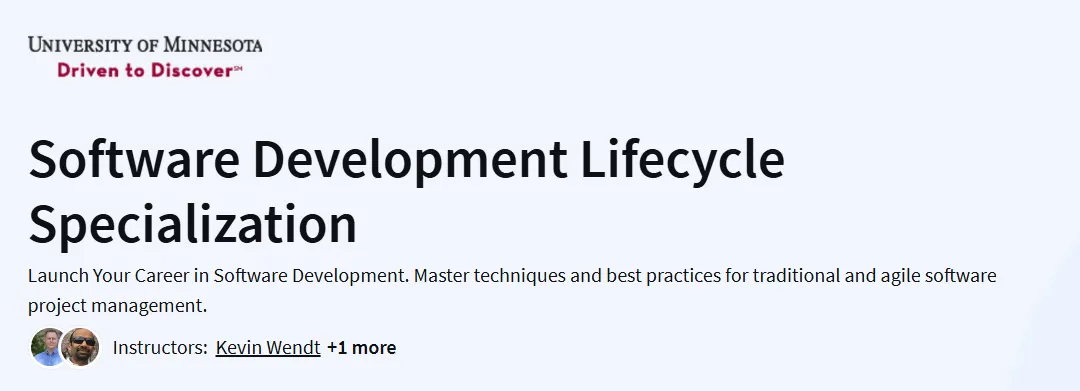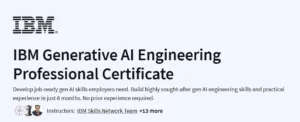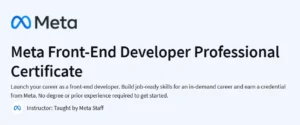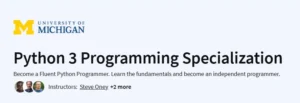What will you learn in this Software Development Lifecycle Specialization Course
Critically analyze software engineering development processes from four selected development philosophies: traditional, secure, agile, and lean.
Describe the trade-offs among these philosophies concerning environmental, organizational, and product constraints
Discuss the workings of exemplary processes within each philosophy.
Perform activities within each philosophy and explain how they satisfy its principles.
Program Overview
1. Software Development Processes and Methodologies
⏳ 20 hours
Gain an overview of how software teams operate, the processes they use, and industry-standard methodologies. Learn to apply core software engineering practices conceptually and compare traditional, agile, and lean development methodologies.
2. Agile Software Development
⏳ 11 hours
Understand agile methods, including Scrum and XP, and why they are suited for situations with unpredictable or evolving requirements. Learn to participate effectively in agile practices and apply agile principles to various scenarios.
3. Lean Software Development
⏳ 9 hours
Explore lean concepts derived from manufacturing and Six Sigma, and their influence on software development. Learn techniques like Kanban, Value Stream Mapping, Lean Startup, and Design Thinking to understand user and market needs efficiently
4. Engineering Practices for Building Quality Software
⏳ 17 hours
Learn to quantitatively measure design quality attributes, establish testable scenarios for evaluating software architecture, and develop skills to ensure quality beyond mere functionality. Understand quality approaches in post-development stages.
Get certificate
Job Outlook
Equips learners for roles such as Software Developer, Software Engineer, and Project Manager.
Applicable in industries like technology, finance, healthcare, and e-commerce.
Enhances employability by teaching practical skills in software development methodologies and quality assurance.
Supports career advancement in software engineering and project management roles.
Specification: Software Development Lifecycle Specialization
|
FAQs
- No, advanced coding is not required, but basic programming familiarity helps.
- The focus is on methodologies, processes, and practices.
- Beginners can still follow since concepts are explained clearly.
- Coding tasks, if any, are minimal and illustrative.
- Strong analytical and problem-solving skills are more useful than coding depth.
- SDLC focuses on development methodologies and engineering practices.
- Project management emphasizes planning, scheduling, and resource handling.
- This course blends methodology insights rather than pure management skills.
- Learners understand how PM frameworks interact with development cycles.
- It’s more technical than traditional project management courses.
- Agile and Lean practices are widely used in marketing, healthcare, and manufacturing.
- Problem-solving, iteration, and quality assurance principles are cross-industry.
- Process optimization is a universal skill across sectors.
- Teams in non-IT industries benefit from Kanban and Scrum adoption.
- The mindset of continuous improvement applies to any organizational setting.
- Helps transition into roles like software engineer, QA analyst, or tech lead.
- Strengthens understanding of multiple development methodologies.
- Demonstrates practical knowledge to employers through hands-on projects.
- Enhances resume with proof of structured learning and process skills.
- Builds foundation for certifications like PMP or Agile Scrum Master.
- Teaches common frameworks used by developers, testers, and managers.
- Builds a shared vocabulary to reduce communication gaps.
- Provides scenarios where multiple roles interact during development.
- Highlights the importance of iteration and feedback loops.
- Prepares learners to adapt to different organizational cultures and processes.





